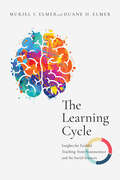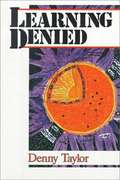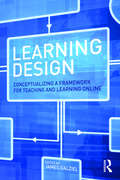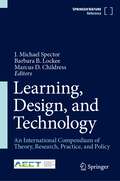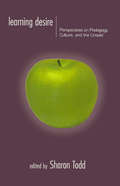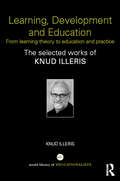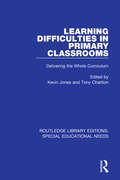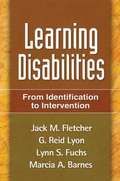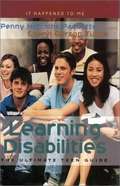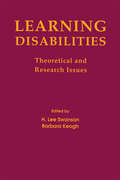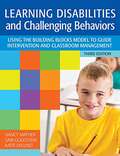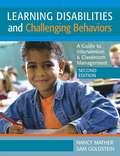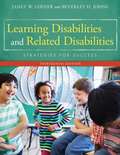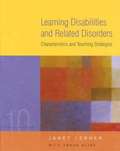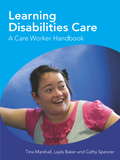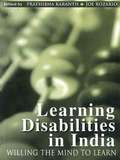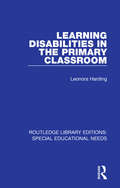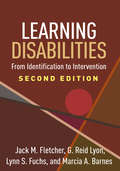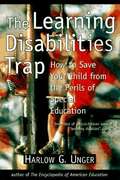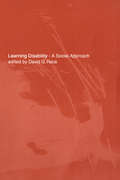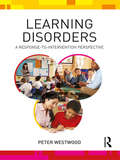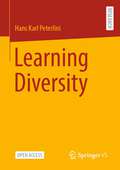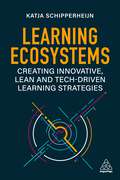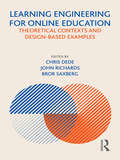- Table View
- List View
The Learning Cycle: Insights for Faithful Teaching from Neuroscience and the Social Sciences
by Duane H. Elmer Muriel I. ElmerHow teachers teach is not necessarily how learners learn.
Learning Denied
by Denny TaylorLearning Denied is a powerful document. Denny Taylor's conclusions confirm many teachers' doubts about America's mania for standardized tests, and serve as a signal to teachers and administrators that a reliance on test results can be more than misleading; it can be a hazard to the child.
Learning Design: Conceptualizing a Framework for Teaching and Learning Online
by James DalzielThe new field of learning design has the potential to revolutionize not only technology in education, but the whole field of teaching and learning through the application of design thinking to education. Learning Design looks inside the "black box" of pedagogy to understand what teachers and learners do together, and how the best teaching ideas can be shared on a global scale. Learning design supports all pedagogical approaches, content areas, and fields of education. The book opens with a new synthesis of the field of learning design and its place in educational theory and practice, and goes on to explore the implications of learning design for many areas of education—both practical and theoretical—in a series of chapters by Larnaca Declaration authors and other international experts.
Learning, Design, and Technology: An International Compendium of Theory, Research, Practice, and Policy
by J. Michael Spector Barbara B. Lockee Marcus D. ChildressThe multiple, related fields encompassed by this Major Reference Work represent a convergence of issues and topics germane to the rapidly changing segments of knowledge and practice in educational communications and technology at all levels and around the globe. There is no other comparable work that is designed not only to gather vital, current, and evolving information and understandings in these knowledge segments but also to be updated on a continuing basis in order to keep pace with the rapid changes taking place in the relevant fields. The Handbook is composed of substantive (5,000 to 15,000 words), peer-reviewed entries that examine and explicate seminal facets of learning theory, research, and practice. It provides a broad range of relevant topics, including significant developments as well as innovative uses of technology that promote learning, performance, and instruction. This work is aimed at researchers, designers, developers, instructors, and other professional practitioners.
Learning Desire: Perspectives on Pedagogy, Culture, and the Unsaid
by Sharon ToddFirst Published in 1998. Routledge is an imprint of Taylor & Francis, an informa company.
Learning, Development and Education: From learning theory to education and practice
by Knud IllerisIn the World Library of Educationalists, international experts themselves compile career-long collections of what they judge to be their finest pieces – extracts from books, key articles, salient research findings, major theoretical and practical contributions – so the world can read them in a single manageable volume. Readers will be able to follow the themes and strands and see how their work contributes to the development of the field. This volume brings together the selected works of Knud Illeris. Leaving a promising business career at age 27 to begin his higher education, Knud Illeris exemplifies the true spirit of youth and adult education that has resulted in him having published in almost twenty countries, including the UK, Germany, China, Korea and Brazil. Knud Illeris’ work revolves around the way learning takes place and in some cases does not take palce. Split into five parts; Learning Theory, Lifelong Learning as a Psychological Process, Special Learning Issues, Various Learning Approaches to Education, Learning in Working Life, Learning, Development and Education: From learning theory to education and practice is arranged thematically and examines youth and adult learning through Illeris’ model based on three dimensions of learning and competence development– emotional, cognitive and social, and four kinds of learning. In this collection of his papers, written over a period of almost five decades, and published in multiple languages, spanning from Faroese to Chinese, some of his most important works are chronicled. This compelling overview of Illeris’ contribution to educational thinking and theory charts the challenges and obstacles faced by disciplination and selection, and offers a genuine impression and understanding of an almost lifelong engagement with a wide range of topics in the field of learning – an engagement which has been the central area of Illeris’ academic life.
Learning Difficulties in Primary Classrooms: Delivering the Whole Curriculum (Routledge Library Editions: Special Educational Needs #33)
by Kevin Jones Tony CharltonFirst published in 1992. This book offers clear, practical guidelines to help ensure that the full breadth of the curriculum is made as available to children with special educational needs as the rest of their peers. The book focuses on primary and middle schools and is directed towards the professional training needs and general interests of teachers and support staff, headteachers, governors and parents.
Learning Disabilities: Educational Principles and Practices
by Doris J. Johnson Helmer R. MyklebustFocuses on practical solutions to educational problems involving spoken language, reading, writing, arithmetic, & nonverbal disorders, making this book a timeless reference for all who desire a thorough understanding of learning.
Learning Disabilities
by G. Reid Lyon Jack FletcherEvidence based and comprehensive, this important work offers a new approach to understanding and intervening with students with learning disabilities. The authors--leading experts in neuropsychology and special education--present a unique model of learning disabilities that integrates the cognitive, neural, genetic, and contextual factors associated with these disorders. The volume addresses classification, assessment, and intervention for a range of disabilities involved in reading, mathematics, and written expression. With a focus on exploring the evolving scientific base of the field, as well as establishing effective educational practices, this book will serve as an essential text and an indispensable resource for school psychologists, neuropsychologists, special educators, and others who work with struggling learners.
Learning Disabilities: The Ultimate Teen Guide
by Penny Hutchins Paquette Cheryl Gerson TuttleWritten for adolescents confronting learning disabilities, this book provides an overview of the most common disabilities and offers advice on overcoming the difficulties associated with them. Medical aspects of the disabilities are covered and celebrities with similar conditions are profiled. Assistive technology is described, and advice is offered concerning advocacy. Paquette is an educational writer; Tuttle is a special education coordinator. Annotation (c)2003 Book News, Inc., Portland, OR (booknews.com)
Learning Disabilities: Theoretical and Research Issues
by H. Lee Swanson Barbara KeoghThis volume has been developed as a direct result of a conference sponsored by the International Academy for Research in Learning Disabilities, held at the University of California at Los Angeles. The text provides a review and critique of current research in the areas of intelligence, social cognition, achievement, and subtyping as they relate to learning disabilities. In addition, the concept that social behavior is an aspect of intelligence and the relationship between language and reading are discussed in detail by noted experts.
Learning Disabilities And Challenging Behaviors: A Guide To Intervention And Classroom Management, Third Edition
by Nancy Mather Ph. D. Sam Goldstein Katie EklundWhy do students in Grades K–12 struggle with social and academic skills, and how can teachers help them develop the competence and confidence they need to succeed? Get practical answers in the new edition of this bestselling book, a staple of teacher training since 2001. It's structured like the popular previous editions: a detailed questionnaire pinpoints each student's individual strengths and needs, and an updated version of the highly effective Building Blocks model helps educators target 12 school success factors with proven strategies and guidelines they can use right away. Reliable, up-to-date research makes this a perfect preservice textbook, and the classroom-ready strategies are a lifeline for in-service teachers as they work toward better outcomes for struggling students.
Learning Disabilities and Challenging Behaviors: A Guide to Intervention and Classroom Management (Second Edition)
by Nancy Mather Sam GoldsteinTwo reasons educators want to implement this book's Building Blocks model in their classroom: They'll have an innovative framework to help them understand the reasons why students in K-12 struggle. They'll have the proven strategies to help students learn. The Building Blocks model is practical, supported by research, and easy to implement. It identifies ten areas important to school success (the building blocks), divided into three levels: the foundational level includes attention and impulse control, emotion and behavior, self-esteem, and learning environment blocks the symbolic processing and memory level contains the visual, auditory, and motor skills blocks the conceptual level comprises using strategies and thinking with language and images A detailed questionnaire for each block helps identify a student's strengths and limitations, cultivate their strengths, address the weaker areas, and develop appropriate accommodations and instructional interventions. Each chapter contains proven teacher strategies to give educators direct information to meet students' individual needs. Once educators understand the causes of students' classroom challenges, educators can design individualized and effective interventions.
Learning Disabilities and Related Disabilities: Strategies for Success (Thirteenth Edition)
by Janet W. Lerner Beverley JohnsThe text that set the standard for students working toward certification in special education has been revised and updated to meet the needs of a new generation of teachers and students. Written for undergraduate and graduate students who are majoring in general education or special education, the book features a cross-categorical emphasis that makes it suitable for a broad number of courses-including those aimed at teaching students with related disabilities and those teaching students on the Autism Spectrum. The authors describe the characteristics of learning disabilities as well as other disabilities, and offer practical teaching strategies for general education teachers, special education teachers, school psychologists, administrators, and related professionals. Pre-service and in-service classroom teachers, who are increasingly responsible for teaching students with special needs within general education or inclusive classrooms, will find LEARNING DISABILITIES AND RELATED DISABILITIES: STRATEGIES FOR SUCCESS, 13th Edition, especially helpful.
Learning Disabilities and Related Disorders: Characteristics and Teaching Strategies
by Janet W. Lerner Frank KlineDesigned to help pre-service teachers and practicing professionals evaluate and aid students with disabilities, this comprehensive text is guided by three main principles: to aid in the assessment and evaluation of students with learning disabilities, to demonstrate Learning Disabled (LD) theory and its practical applications through the use of case studies, and to provide the most up-to-date information on recent developments and topics of debate in the field. The Tenth Edition continues to stress familiarity with state and national standards, specifically those from the Council for Exceptional Children (CEC).
Learning Disabilities Care A Care Worker Handbook
by Tina Marshall Layla BakerWorking with people with Learning Disabilities? Training in Learning Disabilities care? You don't have to go it alone!Caring for people with Learning Disabilities is one of the most challenging and rewarding roles in Health and Social Care. But with a range of awards, certificates and pathways available to work-based learners it can be a confusing area. That's why we've put together a one-stop handbook to support your training and continuing professional development in caring for people with learning disabilities.Here in one place is all the topic knowledge, assessment support and practical advice you will need for a range of learning disabilities qualifications. Core topics are linked to the specific learning and assessment objectives you need to cover for up to 22 QCF units. Case studies tie learning into the many different situations and roles across Home Care, Residential Care, NHS and Private Settings.This book is especially useful for candidates taking the: Level 2 Award in Learning Disabilities Level 2 Certificate in Learning Disabilities Level 3 Award in Learning Disabilities Level 3 Certificate in Learning DisabilitiesIt's also a must have reference for those who want to brush up skills and knowledge from previous qualifications.So whatever your level of specialism, give yourself the tools you need to survive and support your clients with learning disabilities.
Learning Disabilities in India
by Joe Rozario Pratibha KaranthThis important volume, perhaps the first of its kind in India, brings together professionals from diverse fields who share their experiences of tackling the problem of Learning Disabilities (LD) in India. Highlighting the nuances and specificities of learning disabilities and disorders in the Indian context, the contributors cover a wide range of important issues, including: - the neurological, psychiatric and neuropsychological aspects of LD - problems of language and reading acquisition in the bilingual and multilingual situation prevailing in India - issues of identification and assessment - speech and hearing issues, especially central auditory processing disorders and language deficits The contributors also discuss the changing nature of the needs of children with LD, suggest remedies like primary prevention, stress the importance of integrating affected children in mainstream schools and argue for the need to create awareness about learning disorders.
Learning Disabilities in the Primary Classroom (Routledge Library Editions: Special Educational Needs #30)
by Leonora HardingFirst published in 1986. This book is concerned with the problems children have in learning in normal or remedial classrooms, within ordinary primary schools. It deals with children in the 5 to 11 age range but much is also applicable to children at the lower end of the secondary school. It looks at a wide range of difficulties and for each area it classifies and describes the difficulties, considers the numbers of children with the difficulty; and discusses problems of diagnosis and remediation. It reviews certain psychological theories and research findings and relates them to practice; and it describes the work of professionals such as speech therapists, showing how the classroom teacher can support such professionals; but the major concern of the book is to help practicing teachers and teachers in training to work out intelligently for themselves how to improve their performance in this area.
Learning Disabilities, Second Edition: From Identification to Intervention
by Jack M. Fletcher G. Reid Lyon Lynn S. Fuchs Marcia A. BarnesReviewing the state of the science of learning disabilities (LDs) and describing effective educational practices, this authoritative volume has been significantly revised and expanded with more than 70% new material. Foremost LD experts identify effective principles of assessment and instruction within the framework of multi-tiered systems of support (MTSS). With a focus on what works in the classroom, the book explores the full range of reading, mathematics, and writing disabilities. It synthesizes knowledge from neuropsychology, cognitive neuroscience, and special and general education. Illustrations include eight color plates. As a special supplement, a chapter on the history of the LD field from the first edition is provided at the companion website. New to This Edition *Heightened emphasis on intervention, including significant new developments in reading comprehension and math. *Reflects major scientific advances in understanding LDs. *Chapter on principles of effective instruction and MTSS. *Chapter on automaticity in reading, math, and writing. *Chapter on challenges in real-world implementation of evidence-based practices. *Chapter on the validity of the LD construct.
The Learning Disabilities Trap: How to Save Your Child From the Perils of Special Education
by Harlow G. UngerWhy do educators seek to label more than one-third of our nation's schoolchildren as "learning disabled" when clearly they are not? This practical, easy-to-use book answers that question and shows parents of school-age children how to distinguish between normal learning differences and true learning disabilities; how to have your child properly evaluated at the first sign of a learning difficulty; how to help your child convert learning differences into learning advantages; how to select the right school or program for your child; and how to stimulate your child's intellectual development from infancy onward to enhance progress in school. This book shows parents how to give their children the learning tools and support they need. It also includes core curriculum milestones by which parents can evaluate their children's progress and lists of organizations and schools that can help.
Learning Disability: A Social approach
by David G. RaceThe detailed study of learning disability features rarely in university courses. To a large extent this reflects the low value attributed by our society and its human services to people with learning difficulties. This unusual book, based on one of those rare courses, includes contributions from academic specialists, students and people with learning difficulties, all of whom have participated in the course. Its 'social approach' challenges the very idea of what should be taught about the subject of learning disability and who should teach it. Learning Disability - A Social Approach looks at how people's lives are affected by human services. It covers specific policy and service issues, different aspects of working with people and key debates. The unique insights gained from the combination of academic knowledge and real life experience make it a topical and thought-provoking text for anyone involved with learning disability - student, teacher, professional or policy maker.
Learning Disorders: A Response-to-Intervention Perspective
by Peter WestwoodWhat are learning disorders? How can schools endeavour to address these disorders in today’s inclusive classrooms? This book answers these important questions in practical terms and discusses in detail the instructional needs of students with dyslexia, dysgraphia, dyscalculia, dyspraxia and other significant disorders that affect learning. Peter Westwood draws on international research literature to provide supporting evidence of best practices. The book is unique in linking the teaching methods recommended for overcoming learning problems directly to each of the three tiers of support in the Response-to-Intervention Model. It presents examples of effective whole-class teaching, intensive small group instruction and individual tutoring, as well as addressing key topics such as: educational progress of students with learning disorders; principles for teaching dyslexic students; difficulties with writing and spelling; developing students’ numeracy skills; specific intervention strategies; nonverbal learning disabilities. Learning Disorders will be of interest to practising teachers, trainee teachers, teaching assistants, educational psychologists, school counsellors and parents. It will also provide valuable insights for any school planning to upgrade its support system for students with special educational needs.
Learning Diversity
by Hans Karl PeterliniThis Open-Access-book explores diversity in its ambivalence. On the one side, we love to describe diversity as a resource for personal, social, economic, and cultural growth. On the other side, categories of differences often lead to discrimination or serve as justifications for privileges. They can cause exclusion and, conversely, promote the self-constitution of discriminated subjects and groups.The book moves within this tension of exclusion and belonging. Case studies of young ethnicized people vividly depict the interwovenness of identity-building and diversity. Theoretically, the book examines the psychosocial and anthropological conditions for constructing the Other. Sharp divisions between We and the Other, between social and national groups, and between humans and nature have devastating, life-threatening consequences. Dichotomous split-offs divide people, nations and the whole world. So, how do we deal with diversity? The author does not provide simple recipes but engages in a phenomenology of diversity that does not press life and its manifestations into categories but keeps them in a limbo of attention by affirming and doubting differences.
Learning Ecosystems: Creating Innovative, Lean and Tech-driven Learning Strategies
by Katja SchipperheijnBuilding and sustaining an organization which is nimble, adaptable, resilient and future proof is both complex and urgent. Only those with flexible and innovative Learnscapes will succeed.Learning Ecosystems explains how organizations evolve into LearnScapes where learning techniques are aligned with continuous interaction with the ecosystem they are part of. It explains how to upskill and reskill a workforce continuously in an increasingly collaborative and tech-enabled world. Full of practical guidance and strategic advice, this book covers how to take a lifelong approach to learning in the organization and the core competencies needed for this. It explains what to do when building a value and data-driven learning strategy and discusses the symbiosis of people and technology. This book explores lean learning, data analytics, learning technologies including artificial intelligence (AI) and the ethics of using these technologies. There is also crucial guidance on how to take a human-centric approach to innovation. Learning Ecosystems demonstrates the value of continuous improvement and offers techniques for a variety of situations including problem analyses, experimentation and algorithmic business thinking. Most importantly, it provides guidance on how to build a learning culture and a learning ecosystem throughout the company. Supported by case studies from companies including Etihad Airways, ING, ESF and FEDEX, this is essential reading from a leading learning innovator who has helped global organizations to rethink their learning strategies to achieve sustained business growth.
Learning Engineering for Online Education: Theoretical Contexts and Design-Based Examples
by Chris Dede John Richards Bror SaxbergLearning Engineering for Online Education is a comprehensive overview of the emerging field of learning engineering, a form of educational optimization driven by analytics, design-based research, and fast-paced, large-scale experimentation. Chapters written by instructional design and distance learning innovators explore the theoretical context of learning engineering and provide design-based examples from top educational institutions. Concluding with an agenda for future research, this volume is essential for those interested in using data and high-quality outcome evidence to improve student engagement, instructional efficacy, and results in online and blended settings.
